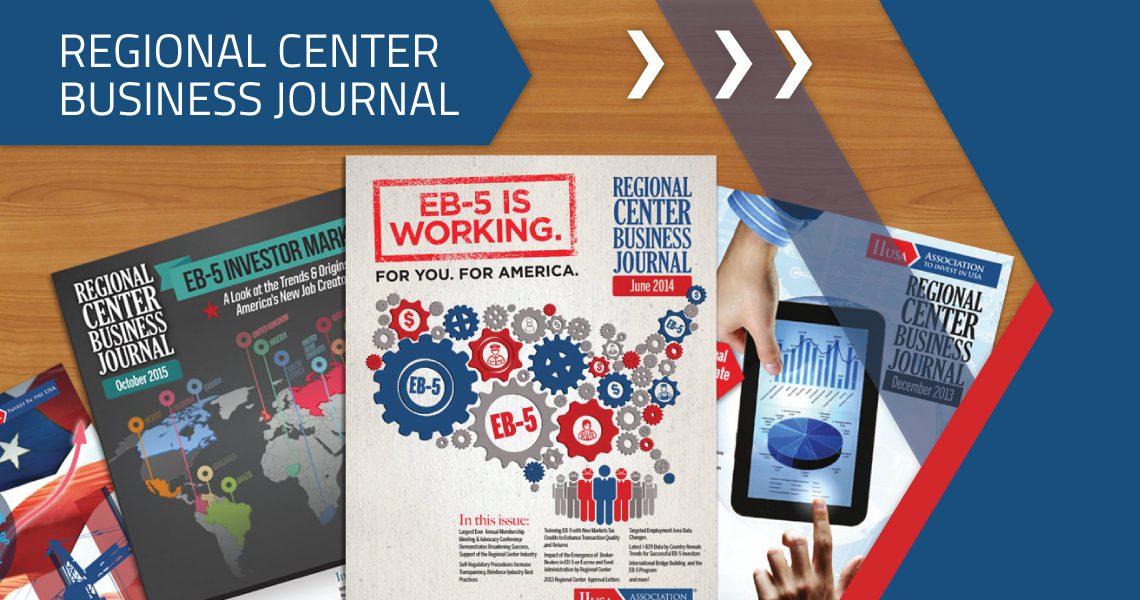 What Do Chinese Migration Agents Really Want?
What Do Chinese Migration Agents Really Want?
Lili Wang, Managing Partner, New City Group
Chair, IIUSA Investor Markets Committee
Chinese migration agents are an integral part of the EB-5 securities syndication process. They have the difficult task of helping potential EB-5 investors navigate the criteria and complexity of the EB-5 immigration process. In order to be effective in this role, agents must gain the trust of investors, ascertain the credibility of project sponsors, and ensure the success of both through the EB-5 offering. This is a multifaceted role, developed and maintained in the face of cultural, language, and professional chasms. It is also one rife with frustration. One agent says:
“My English is limited, so is my knowledge in finance and investments. I don’t have effective methods to deal with trouble if they arise. This is why I have to resort to picking projects by brand name predominantly. I don’t like this approach, but what can I do?”
“英文水平不够,缺少投资背景知识,缺乏有效手段,最后我们只能是选择相信明星企业。 不希望这样,但是没办法 “
In order to develop a trusting relationship with investors, agents must show confidence, competence, and commitment. Many agents told us that they gain credibility with investors by taking on full responsibility for their EB-5 success. Because agents are the main points of contact for Chinese investors, they are also who the investors seek out when things go wrong. Therefore, it is crucial for agents to be able to trust in and rely upon the merits of their referral projects and project sponsors.
In our continuous dialogue with these agents, we repeatedly encounter several complaints that if discussed and resolved, would optimize the EB-5 process for all stakeholders. We have summarized our conversations into the following comments that address the question: what do agents really want?
First and foremost, agents want credible partners. Once they’ve built a trusting relationship with potential investors, agents want to confidently refer them to sound projects with credible project sponsors. However, given their limited familiarity with due diligence on the U.S. side of operations, how can agents effectively discern among project sponsors? Many agents rely on the documentation given to them, but as one agents indicates, it’s seldom sufficient:
“How can I read through all these legal words? I’m supposed to just take what they give me? What if what they give me is bad [for investors]? They say all these good things in the offering materials, but they don’t give me proof backing these things up. Really, I wouldn’t know how to ask the right questions. I always feel like they are hiding things, but I don’t know how to get the truth. I feel like for all these projects, if I actually learned the whole truth, I wouldn’t like it. So maybe I look for track record, but I know projects are different from each other, so that doesn’t always work either…”
“这几百页的法律文件我怎么看?这些文件我又没参与制定,如果他们不负责任怎么办? 每个项目都说自己有多好多好,但又不提供验证手段,这让我怎么去深入挖掘一个项目?我有时觉得项目方有很多事请没告诉我,但我也没有办法啊。 对于这些项目,有些东西要是全都弄明白了可能还更麻烦。最终我只能看经验和品牌,但每个项目都不同,这也不是好办法…”
Per the above, as a partial solution, many agents choose to build systematic relationships with proven projects sponsors, but this comes at the cost of excluding new entrants who want the chance to build a track record.
This is why openness and transparency is so important in EB-5 syndication. Aside from the fact that securities law requires fair and full disclosure, frank discussions between project sponsors and agents about project’s merits and risks indicate a level of confidence in the project sponsor. After a string of project failures, be they denials of I-526, inability of projects to repay, or outright fraud, agents are wary of projects that push glamour over substance and that avoid delving into the substance of the offering. They dislike being rushed into agreements before having fully digested the materials. Open, honest communication, responsiveness to agent inquiries, and high quality underwriting will help an offering gain traction.
Communications with agents do not end at conversations with the boss or general manager. The education process is quite long and involved. Agents typically have a team of consultants who interface directly with investors, and they must fully understand a project to be effective and comfortable in their project referrals. Open discourse is crucial. An agent’s confidence is augmented by candidly discussing downside scenarios and the recourse potential investors may have. This empowers investors, and arms agents with information instead of marketing speak. To quote another agent:
“It’s relatively easy to sell projects that are in hot locations. But location alone is not enough. Investors are getting more knowledgeable, it’s not uncommon that some of them speak better English than I do and are more familiar with the US than I am. I hate it when I don’t have answers to the tough questions, if they sense that we’re not equipped to tell them what they want to know, they leave.”
“好地点相对好卖,但是光是地点也不够。现在投资者了解的越来越多,有的英文比我好,对美国比我还了解。回答投资者的问题也越来越难,一次回答不好,投资者觉得你没有料的话就不会找你做了。”
In essence, agents want to know that a project can take care of their investors after referral. Scarred by the rise in SEC investigations and projects that have failed, it’s no wonder that many agents are growing cynical. One agent says:
“Even if you find a world-class team who has done all the work they could in thorough analysis, what happens after [the investors] wire the money? If they misappropriate the money for uses they are not supposed to, what can you do? The worst part about regional center funds is that they’re all new companies, so even if you get to them, there’s no cross-collateral recourse for investors. Besides, you’re not in the U.S., and you’re not sitting in [the project company]. They decide how to make their reports. After you’ve chased them down, they’ve already spent the money. If [a project] wanted to trap [investors], there’s no way to prevent it no matter how wary you are.”
“就算你找一个顶级的团队对所在项目进行了无以伦比的分析,当你把钱打给他之后,他拿着钱挥霍了挪用了你又能怎样?而且区域中心最缺德的地方是必须是全新的公司,这样连追他上家都没希望了。况且你人不在美国,人不在他公司,报表怎么做还不是项目方自己说了算,等你追查够了人家早把钱花光了。真是开始就想弄你圈钱的永远是防不胜防。“
Agents are responsible for their investors, and they want to see that a project has considered investor protection and advocacy, while giving investors recourse should things go wrong. This could mean strict escrow release structures with the ability to return funds to investors should their I-526 petitions be denied. This also means proactively providing rights to investors as members or limited partners, limiting the discretion of the project manager, or providing third-party monitoring and recourse. It’s helpful for agents to see that the sponsor has made provisions to protect the investors post-investment, even after obtaining their permanent green card. While no one can predict the future, provisioning for the downside can be powerful.
Another area of frustration among agents is US EB-5 legislation. Agents worry about the growing wait times due to retrogression, and fear that it will deter investors from the US program altogether. From an agent:
“The current retrogression times are so long, so is the adjudication times, can’t do EB-5 anymore. Europe is more attractive. I hope they can quickly make changes in law, widen the visa limits and decrease the pressure.”
“现在排期怎么长时间,审批的时间也长,EB-5没法做了。相比之下欧洲移民业务更有吸引力。希望美国移民局和国会可以尽快通过移民签证改革法案,放宽签证限制,有效减排排期压力。”
With over 18,000 investors currently in cue, it may take 6-8 years to obtain the benefits of the temporary green card. This contracts sharply with the investment immigration programs in Europe, where a simple housing purchase solidifies permanent residency. Agents who are licensed for both US and Europe migration are increasingly recommending European programs. In addition to expediency for the investor, agents are also compensated more rapidly. We often hear rumors that the USCIS will fix the visa bottleneck with unused quotas from previous years. This is an indication of what agents would like to see from the USCIS.
Finally, the regional center extension seems to be a mixed-blessing for some agents. One says:
“The 9 month extension this time, feels like the wrestling from various parties is not resolved. It’s not impossible that there will be changes at the end of 9 months. This makes us unsettled.”
“这次延期9个月,感觉各方的角力还没有结束,看来9月底前再出现改变也不是不可能,让我们很不踏实”
This nine-month window continues the urgency to get projects done, but does not allow for clarity in planning the future pipeline. Therefore agents may remain hesitant in taking on new projects, especially with untested new entrants
EB-5 is a highly competitive market, and agents want to feel confident when making project referrals. They highly value their reputation and therefore take responsibility for the investors they’ve introduced. Hence, agents are as concerned as any investor would be with project quality, investor rights advocacy, monitoring, and recourse. They want projects that make a point of providing investor protection, fully comprehending the risks involved, but also proactively mitigating them for investors. It is not easy to syndicate private, institutional, U.S. securities to foreign, retail, and often non-English-speaking clients. Agents just want projects that can earn and maintain the trust that they’ve worked to build with their investors.
We spoke with 25 agents from Beijing, Shanghai, Harbin, Jinan, Zhengzhou, Chengdu, Chongqing, Guangzhou, Shenzhen, and Xiamen. Some agents are well-established, while some were small to medium sized.








